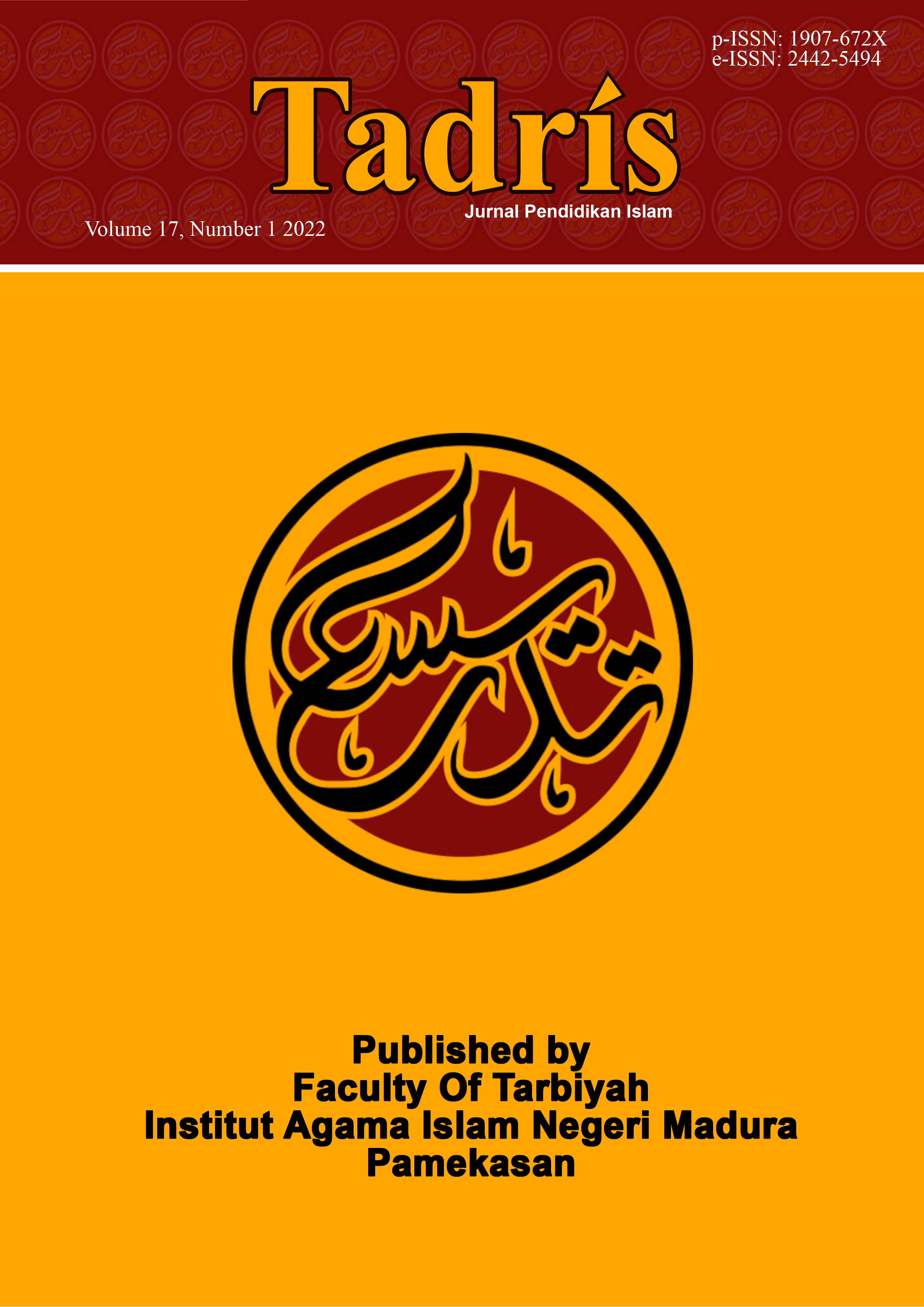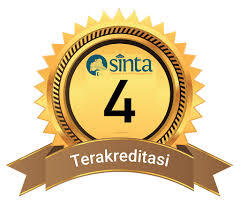Dormitory Distinction and Integration of Islamic Education Basic Values in “Kampung Inggris” Pare
 Abstract views: 306
,
Abstract views: 306
,
 PDF downloads: 299
PDF downloads: 299
Abstract
Various language course institutions in Indonesia are more focused on business oriented and ignore cultural values. Unlike the language institutions in Pare, Kediri, the dichotomy of material and moral values is actually dissolved in local language institutions. The focus of this research was to portray the existence of reduction of Islamic value in the course institutions in Kampung Inggris (English Village), Pare, Kediri. Especially, additional activities carried out in the dormitory of the courses by assimilating lokal of Nahdlatul Ulama (an Islamic organization in Indonesia) traditions with the needs of language institutions. This research was conducted in the form of qualitative research by conducting observations and interviews. Interviews were conducted in the form of deep interviews to obtain broader and deeper data. Data collection was also carried out by involving the researcher directly and actively as an outsider in activities carried out by local communities assimilating to the agenda of the lokal course institutions. The result is that lokal culture in the form of values and norms contributes to its own uniqueness in Kampung Inggris that are not found in other course institutions of other regions. These activities are accepted and applied in lokal course institutions with agendas such as tahlilan (ritual of salvation), islamic congregational prayer, diba'an ( prayer to God and Prophet) and so on.
Downloads
References
Abdullah. “‘Pendekatan Dan Model Pembelajaran Yang Mengaktifkan Siswa.’” Edureligia 1, no. 1 (2017): 53.
Abdurrahman. Slametan; Studi Antropologi Agama Dan Budaya Jawa. Kediri: Salaf Press, 2017.
Abdurrahman Saleh. Pengantar Ilmu Dan Metodologi Pendidikan Islam. Jakarta: Ciputat Press, 2002.
Arga. “Interview,” 2018.
Bartin, Tasril. “‘Pendidikan Orang Dewasa Sebagai Basis Pendidikan Non Formal.’” Jurnal Teknodik 19, no. X (2006): 156.
Clifford Geertz. Abangan, Santri, Priyayi Dalam Masyarakat Jawa. Jakarta: Pustaka Jaya, 1989.
Dian. “Interview,” 2018.
Endang turmudi. Perselingkuhan Kiai Dan Kekuasaan. Yogyakarta: LKIs, 2004.
fauzi. “Interview,” 2018.
Helfi. “‘Contributions of Kampung Inggris Pare and Its Implications for Unskilled Muslim Migrant Workers.’” Jurnal Islam Realitas: Journal of Islamic and Social Studies 5, no. 1 (2019): 17.
Ian. “Interview,” 2018.
John M. Echols dan Hassan Shadily. Kamus Inggris Indonesia. Jakarta: Gramedia, 2005.
Khaziq. Islam Dan Budaya Lokal; Belajar Memahami Realitas Agama Dalam Masyarakat. Yogyakarta: Teras, 2009.
Kusnul Dwi Anitasari. Dari Desa Menjadi Kampung Inggris (Kajian Sejarah Perekonomian Desa Tulungrejo Pare Kediri 1977-2011. Malang: UM, 2013.
Nur Afni Lathifah. “‘Dinamika Pengelolaan Kampung Inggris Oleh Masyarakat Di Desa Tulungrejo Kecamatan Pare Kabupaten Kediri.’” Jurnal Sosial Dan Humaniora 9, no. 2 (2020): 196.
Putra, Yerri S. Minangkabau Di Persimpangan Generasi. Fakultas Sastra, Universitas Andalas, 2007.
Rachmat Taufiq Hidayat. Belajar Mudah Bahasa Inggris. Yogyakarta: Pustaka Pelajar, 2006.
Salim, Peter. The Contemporary Indonesia-English Dictionary. Jakarta: Modern English Press, 2003.
Shaleh. “Interview,” 2018.
Subiyantoro, Andri Septilinda Susiani dan. “‘Manajemen Boarding School Dan Relevansinya Dengan Tujuan Pendidikan Islam Di Muhammadiyah Boarding School (MBS) Yogyakarta.’” Jurnal Pendidikan Madrasah 2, no. 2 (2017): 331.
Sumarsono dan Paina Partana. Sosiolinguistik. Yogyakarta: Pustaka Pelajar, 2007.
Suzy Azerharie. “‘Pola Komunikasi Antara Pedagang Dan Pembeli Di Desa Pare, Kampung Inggris Kediri.’” Jurnal Komunikasi 7, no. 2 (2015): 207.
Teguh Budiharso. Prinsip Dan Strategi Pengajaran Bahasa. Surabaya: Lutfansah Mediatama, 2004.
Tim Undang-undang Sisdiknas. “Undang-Undang Sistem Pendidikan Nasional No. 20 Tahun 2003,” 2003, 7.
Copyright (c) 2022 TADRIS: Jurnal Pendidikan Islam

This work is licensed under a Creative Commons Attribution-NonCommercial 4.0 International License.
The journal operates an Open Access policy under a Creative Commons Non-Commercial 4.0 International license. Authors who publish with this journal agree to the following terms:
- Authors retain copyright and grant the journal right of first publication with the work simultaneously licensed under a
 Commons Attribution-NonCommercial 4.0 International License
Commons Attribution-NonCommercial 4.0 International Licensethat allows others to share — copy and redistribute the material in any medium or format, and adapt — remix, transform, and build upon the material.
- Authors are able to enter into separate, additional contractual arrangements for the non-exclusive distribution of the journal's published version of the work (e.g., post it to an institutional repository or publish it in a book), with an acknowledgement of its initial publication in this journal.
- Authors are permitted and encouraged to post their work online (e.g., in institutional repositories or on their website) prior to and during the submission process, as it can lead to productive exchanges, as well as earlier and greater citation of published work (see The Effect of Open Access).














